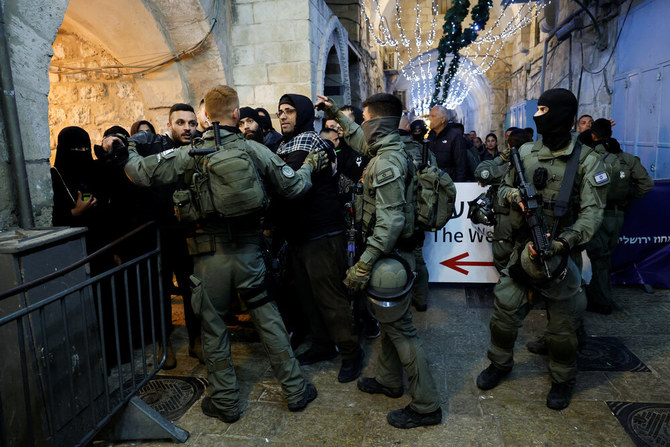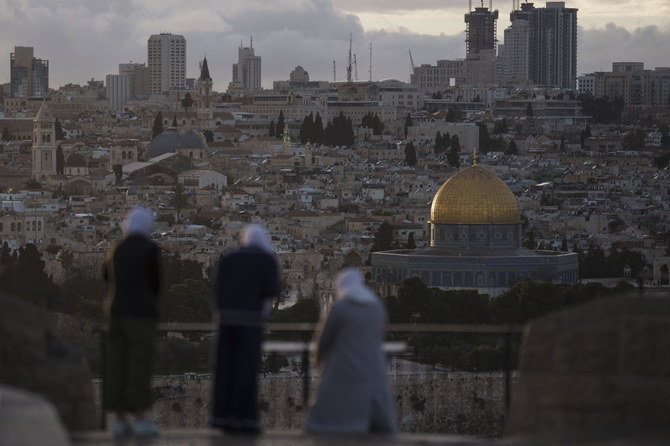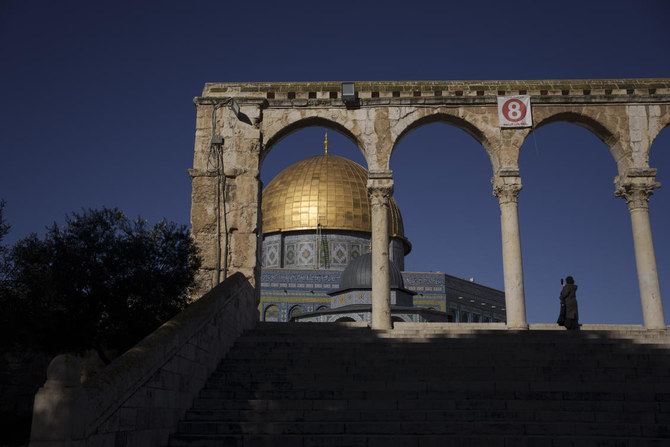The tightened restrictions had led to a steep drop in the number of worshippers at the mosque, officials said, with just 20,000 attending the taraweeh prayer on Wednesday, down from 80,000 the day before.
Hundreds of worshippers performed the fajr prayer on the thresholds of Al-Aqsa, but as soon as it ended, Israeli forces removed them from the area.
Police allowed fewer than 40 Palestinians to enter the mosque on Thursday morning.
The Israeli extremist Temple organizations have called on their supporters to storm Al-Aqsa during the Jewish Passover that ends next week.
Omar Al-Kiswani, director of Al-Aqsa Mosque, told Arab News that several Muslims were unable to offer the fajr prayer on Thursday because of Israeli restrictions, a heavy military deployment at the gates and a lockdown in the West Bank that will remain in place until Saturday.
A total of 199 settlers had stormed Al-Aqsa under the protection of the Israeli police on Thursday, he said.
Experts said the cost of the damage caused by Israeli police inside the mosque on Wednesday could run into the tens of thousands of dollars. Precious glass windows, doors, Qur’an libraries and a clinic were all damaged.
Al-Kiswani said this had become a policy of the occupation forces during their crackdown at the holy site.
The third Friday of Ramadan is set to come amid a strict security situation in the West Bank and Gaza Strip. It is not known if the Israeli authorities will allow worshipers to reach Al-Aqsa.
Also, the third-Friday sermon will be a challenge for the preacher who could be accused of incitement against the Israeli authorities.
Al-Kiswani said Al-Aqsa preacher Mohammed Sarandah was summoned by Israeli security authorities before the start of Ramadan and accused of inciting worshippers. He was removed from Al-Aqsa for two months.
“We are more concerned about calm in Al-Aqsa Mosque than the Israelis because calm attracts more worshipers during Ramadan,” Al-Kiswani said, adding that an intervention by Arab and Islamic countries could stop Israeli incursions into the mosque.
On Thursday, Jordan and Palestine submitted a joint request to the UN Security Council to hold a closed-door emergency session on Friday to discuss Israeli violations at Al-Aqsa Mosque.
Jerusalemites told Arab News that the repressive measures there were intended to embarrass Jordan and prove that the Jordanian leadership was unable to protect the sacred site.
Jordan has been the official custodian of Muslim and Christian holy places in Jerusalem since 1924. For Muslims, Al-Aqsa represents the world’s third-holiest site.
Fatah’s prominent leader in East Jerusalem, Ahmed Ghuneim, said the Israeli tampering with the status quo at Al-Aqsa constituted a threat to Jordan and would destabilize its internal security and stability.
Political analyst Ghassan Al-Khatib told Arab News that Israel’s right-wing government was deceiving Jordan by giving it promises to preserve the status quo at Al-Aqsa, while Israelis were taking advantage of its lack of power.
Jerusalemites said the Israeli occupation had used different methods to reduce the number of Palestinian worshipers at Al-Aqsa over the past two decades to allow settlers to storm it and carry out their religious rituals without significant resistance.
Meanwhile, a 15-year-old Palestinian boy, Khader Ghurab, was injured after being shot by a settler in the old city of Jerusalem late on Wednesday.






















